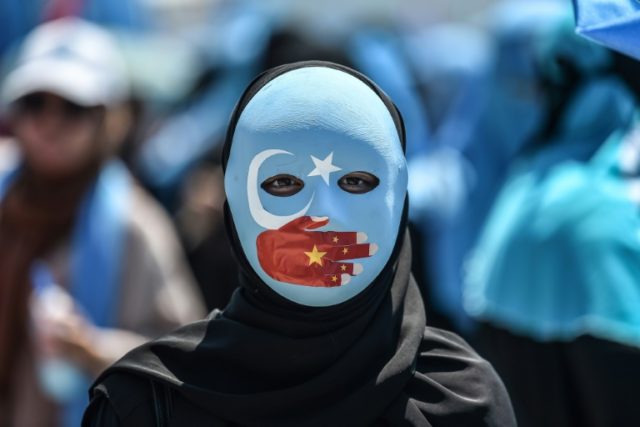Some Muslim Uighurs from China’s Xinjiang province residing in Pakistan have accused Islamabad of silencing their complaints about Beijing’s abuse of Muslims at the behest of China, the cash-strapped South Asian country’s most significant economic ally, Al Jazeera reported Monday.
Referring to the estimated 2,000 Uighurs (or Uyghurs) in Pakistan, Al Jazeera noted, “Their presence here has not gone unnoticed by China, Pakistan’s ‘iron brother’ and a helping hand at a time of economic crisis. According to the community, China has started putting pressure on Pakistan to silence its critics.”
“They want to finish off Uighurs,” Abdul Hameed told Al Jazeera, referring to the Chinese. “Here, we cannot do anything according to our wishes because China is after us.”
“There is danger for every one [of us] in Pakistan now,” Mohammad Umer Khan, the founder of a Pakistan-based organization called Umer Uighur Trust, added. “Whoever starts saying I am Uighur, I am Turkistani, is in danger.”
The accusations came amid news reports that China’s financial support for Pakistan has bought Islamabad’s silence over Beijing’s internment of up to one million predominantly Uighur members of the nation’s Muslim minority in internment camps, where they are forced to renounce their religion and pledge loyalty to the Communist Party.
In an exclusive interview with Turkey’s TRT News, Pakistan’s Prime Minister Imran Khan recently said, “I do not know much about the situation. … The Chinese have been extremely helpful to us… I would never talk about it [Uighurs concentration camps] in public.”
The Uighurs are an ethnic Turkic people, and Turkey has been one of the few Muslim countries to question China’s legal policy, though they have not cut key economic ties with Beijing.
Both the U.S. and the United Nations have highlighted the imprisonment of hundreds of thousands of mainly Uighur Muslims — but also Kazakhs and Kyrgyz — at the Chinese concentration camps, also known as mind transformation centers.
Claiming that the camps are vocational and educational centers aimed at combatting terrorism and religious extremism, China has repeatedly denied that Beijing is subjecting detainees to communist indoctrination, systemic torture, disappearances, executions, and arbitrary detentions, among other crimes, at the facilities.
In the wake of China’s most recent pledge to loan financially troubled Pakistan hundreds of millions of dollars, Islamabad has abruptly stopped calling out Beijing’s mass oppression of Muslims, buying into China’s claim that the facilities are vocation centers.
“Some section of foreign media are trying to sensationalize the matter by spreading false information,” Mohammad Faisal, a spokesman for Pakistan’s ministry of foreign affairs, declared, the Agence France-Presse (AFP) agency reported last month.
Faisal’s comments came days after the Associated Press (AP) reported that over 200 Pakistani businessmen urged Beijing to release their Uighur Muslim wives, saying they have been caught in the net of Beijing’s crackdown on Islam adherents.
Marking what the Guardian described as “one of the first public criticisms from a majority Muslim country over China’s policies” in Xinjiang, Islamabad reportedly demanded in September that Beijing take “urgent steps for the release of over 50 Chinese wives” of Pakistani men arrested in predominantly Uighur Muslim Xinjiang province.
Now, Pakistan has changed its tune, likely succumbing to pressure from China, one of the country’s top economic aid provider.
Uighur-majority Xinjiang, China’s largest province, borders several Muslim-majority nations, including Afghanistan and Pakistan-controlled Kashmir, a region claimed by Beijing, New Delhi, and Islamabad.
“China knows that the plight of Uighurs has already generated major headlines and negatively impacted its global image. So, it doesn’t want Uighurs in Pakistan, where they have more freedom to speak out, bringing more attention to an issue that Beijing wants kept quiet,” Michael Kugelman, the deputy director of the Asia program at the Wilson Center, told Al Jazeera.
In addition to pledging $2 billion to help Pakistan’s financial woes, Beijing has also invested $62 billion in the construction of the China-Pakistan Economic Corridor (CPEC), a component of China’s ambitious Belt and Road Initiative (BRI), also known as the One Belt, One Road (OBOR).
China is also Pakistan’s top military ally.

COMMENTS
Please let us know if you're having issues with commenting.